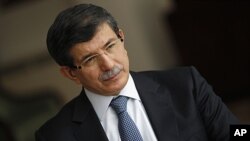Turkish Foreign Minister Ahmet Davutoglu has called for an international show of solidarity with the Syrian people and pressure on the Syrian president to stop the massacre of his people.
Speaking to an audience in Washington Friday, Davutoglu said that like-minded nations should look for ways outside the United Nations to send a strong message to the Syrian people that they are not alone.
He said since the first Arab uprising in North Africa last year, Ankara has been on the side of the people even if such a policy could have been risky in case a leader, such as Egypt's Hosni Mubarak, had stayed in power.
"Turkey has a consistent approach," said Davutoglu. "We are against any oppression in our region. We don't want to see autocratic tendencies. We don't want any regime, seeing their country as if it is their own personal property or property of one archaic ideology, but that it belongs to the people of that nation. And Turkey in principle is against any foreign intervention. We showed that many times. But if there is oppression by an autocratic regime against the people, nobody can expect us, or the international community, to be silent."
Davutoglu said that Syrian President Bashar al-Assad has lost all credibility both inside Syria and around the world and must step down. He said Assad's rule belongs to the Cold War era when governments were sacrificing freedom in the name of security from possible enemies, such as communists, hostile neighbors, terrorists and others.
In an interview with VOA Friday, the Turkish foreign minister urged the world community to support all new governments in the Arab world to ensure they are successful and can serve as example to others.
"Young people and those who are now demonstrating in different Arab capitals for a better life, this is a success story," Davutoglu added. "We never claim that Turkey should be a model for them, but if they want to benefit from our experience, of course we are ready to share our experience."
Davutoglu said that his country is a stable democracy with a healthy economy, located between a politically unstable Arab region and economically turbulent Europe.
Turkish FM Davutoglu Calls for Solidarity with Syrian People




